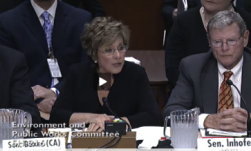Although Senate Republicans had hoped the carefully crafted compromise over the Transportation Enhancements program would stand, some House members are stating their insistence that the program be stripped out entirely in conference.

Transportation Enhancements is the primary source of funding for bicycle and pedestrian projects. It comprises less than two percent of total federal transportation funds but has been a source of bitter contention, nearly derailing talks in the Senate. The two sides eventually made a deal under which TE is subsumed under the Congestion Mitigation and Air Quality Improvement program’s “additional activities” category. Per that agreement, states can opt out altogether, and some road uses compete with bike and pedestrian projects for funding. An amendment to maintain some local control over the funds made it somewhat more palatable for advocates.
Sen. James Inhofe, the conservative top Republican on the Environment and Public Works Committee, warned House members at the outset of the conference that "the conservative position is to pass this thing," even if members are not 100 percent satisfied with the compromise. The changes to the enhancements program constituted "the most meaningful reform to conservatives" in the bill, he said.
Transportation conference chairwoman Barbara Boxer said today that lawmakers "have a chance" to make the bill longer than two years, as the Senate bill is written. She also said that 80 percent of the EPW Committee's portion of the bill is not controversial and has been agreed to. According to Boxer, House Speaker John Boehner told her last night that he has instructed House negotiators to get a bill done.
Still, a staffer familiar with the ongoing conference talks has told Streetsblog that TE is again an issue of contention. Freshman Republicans have made a point of expressing their dissatisfaction that any funding whatsoever remains in the bill.
In addition to TE, Republicans took issue with one of the most popular bill elements among transportation reformers: the provision allowing for more flexibility for transit agencies in times of high unemployment. The Senate bill allows agencies in such cases to spend federal funds normally reserved for capital improvements on operations. GOP opposition to these programs is part and parcel of the urban/rural divide, according to Streetsblog's source, who said some House members are bent on redistributing money from urban areas to rural districts.
Many House members also oppose Senate bill language that would, for the first time, give safety oversight responsibility to the FTA. Though the federal government has a role in overseeing road, air and rail safety, conservatives have resisted expanding oversight to transit.
Changes to environmental reviews have also led to "lots of yelling," the source said.
The Tea Party-backed House members making hay about these issues have been the only lawmakers showing up at meetings that are largely among staffers. Our source said it's set up an uncomfortable dynamic and has put a chill on what should be frank conversations. The professional staff members understand they're there to compromise, but the lawmakers themselves don't seem inclined to do so. No one has conceded anything, we hear.
The much-ballyhooed Keystone pipeline is a significant point of contention, but it's not the only one, and some Democrats complain that it's getting far too much attention in the mainstream press -- to the point that reporters often ask lawmakers whether they're really going to allow the whole process to be stymied over the pipeline issue. Democrats, of course, feel that it's Republicans who are hamstringing the conference by insisting on something they know will provoke a presidential veto.
Our source said the committee staff is still "walking through" the bill section by section and identifying areas of disagreement, of which there are many. Senator Harry Reid told reporters yesterday that 80 percent of the issues had been resolved, but the staffer we talked to, while not explicitly refuting the majority leader's assertion, wasn't so sure.
The Finance committee staff is reportedly meeting tomorrow for the first time to tackle the other thorny issue: how to pay for the bill.
The seven Tea Party members showing up to all the meetings aren't the only obstacle to agreement -- there are lots more compromise-averse freshmen in the House who could vote no on the conference report. If that's the case, Republican leadership would need to count on Democrats to vote for it.





